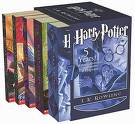Harry Potter - Page 11 of 11
Warning: This review will be biased. I grew - Page 11 - Sciences, Education, Art, Writing, UFO - Posted: 24th Jul, 2016 - 4:10pm
 Here Is One Review: I have a nephew that just loves Harry Potter. He thinks Harry Potter is the greatest thing next to ice cream sundaes. He has all of his movies that are out in the stores and all the merchandise with the Harry Potter logo on it, toys, bed sheets, books, pens, etc. I have bought much of the Harry Potter stuff for him. Including his first Harry Potter book. I have tried to read the books and even rented one of the movies to see if Harry Potter was all that and a pack of chips. But I just couldn't rate him to well. Maybe Harry Potter and I were never ment to be.
Here Is One Review: I have a nephew that just loves Harry Potter. He thinks Harry Potter is the greatest thing next to ice cream sundaes. He has all of his movies that are out in the stores and all the merchandise with the Harry Potter logo on it, toys, bed sheets, books, pens, etc. I have bought much of the Harry Potter stuff for him. Including his first Harry Potter book. I have tried to read the books and even rented one of the movies to see if Harry Potter was all that and a pack of chips. But I just couldn't rate him to well. Maybe Harry Potter and I were never ment to be.Harry Potter - Page 11
Warning: This review will be biased.
I grew up with the Harry Potter books. When I was very young, my dad bought the first book, and offered to read it to me as a bedtime story. He gave up on it at some point, as I always wanted him to read the next chapter, and bought me the audiobooks read by Stephen Fry. Unfortunately, we lost most of the tapes for a while, so as a result of this, I can recite almost the entire first chapter of Philosopher's Stone by heart. Harry Potter ignited my passion for reading, and I began reading everything I could get my hands on, including each of the following books as they came out. It didn't take a good imagination (Although I had one) to imagine myself as Harry Potter or one of his friends, exploring the castle and grounds of Hogwarts, and it ignited my interest in two things. The first, was reading, and later creative writing in school, while the second was history. I took an interest in the medieval period, and often juxtaposed my vision of Hogwarts onto the castles I visited with family and school. Harry Potter was the craze of my time, although I didn't really choose a favourite until the series finished, and even then, I could only narrow it down to two books: Harry Potter and the Deathly Hallows and Harry Potter and the Prisoner of Askaban.
My least favourite of the books was the Chamber of Secrets. In all honesty, while I love Dobby as a character, I really didn't get everyone turning from reverence to The Boy Who Lived, to fear of the supposed Heir of Slytherin (Although the fight scene with the Basilisk in the movie was one of the best fight scenes in the series in my opinion).
Now that I look back on it, Philosopher's Stone had a very Dungeons & Dragons feel to it: Fight/overcome monster (Fluffy), environmental trap, physical challenge, physical puzzle room, logic puzzle room and final boss.
Prisoner of Askaban is a lot of people's favourite, as it breaks the mould. Most of the books are: go to school, find out about some evil thing in the school, tell people, and not be believed, decide to do something about it themselves, and fight Voldemort, while Prisoner of Askaban tells a story that reunites Harry with his Godfather, introduces time travel (But doesn't make it a deus ex machine), finds out about some of the secrets of Hogwarts and stops a Hippogryff from getting it's head chopped off.
Goblet of Fire also breaks the mould, and introduces us to more of Rowling's world, in the form of foreign wizards from Beaubatons and Durmstrang. Many of the tasks are interesting to read about, and later to watch in a movie, and the connecting of the Phoenix Feather cores, and Voldemort's blunder in using Harry's blood to resurrect himself (Which is how Harry survives the killing curse the second time, spoilers!). This book simultaneously brings Voldemort back from the dead, and sets up the conditions about which he might be defeated.
Order of the Phoenix uses the connection between Harry and Voldemort established in the previous books for Voldemort to plant false visions so he can get something from the Ministry of Magic, which only Harry can retrieve. This book also introduces Dumbledore's Army, a defence against the dark arts group run by Harry since the current year defence against the dark arts teacher won't teach them to fight. This culminates in a small group of students going to the ministry to save Harry's godfather from book 3, who Harry has been having visions of Voldemort hurting in the Ministry. This culminates in Sirius' death, and Harry is unable to save him, and is almost killed by Voldemort. In the movie (And the book), there is a good fight scene at this point between Dumbledore and Voldemort.
 TOPIC: Harry Potter
TOPIC: Harry Potter